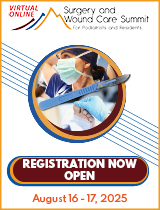|
|
|

|
Search
02/19/2020 Lawrence Oloff, DPM
What Kind of Podiatrist Do Today's Residents Want to Be? (Alan Sherman, DPM)
I believe this dialogue about “advanced foot
and ankle vs. general practice podiatrist”
espoused by Dr. Sherman misses many key points.
It bothers me that after all the progress that
I have seen our profession make, there are
still advocates that want to have our
profession take two steps back. I have been
involved with podiatric medical education for
forty plus years and continue to do so today as
a residency director. These are my
observations.
Completing residency does not force its
graduates to perform advanced surgery, or for
that matter any surgery at all. The extent of
ones practice is purely up to the discretion of
each graduate of a residency program. Residency
just allow its graduates to provide basic
competency in the care of their patients, both
as generalists and as surgeons. Finishing a
residency is just the beginning of obtaining
competency as a practitioner. It takes a
lifetime to hone in on those skills. Fellowship
programs exist for even more advanced training,
allowing one fast track ones interest in
surgery of that is what is desired.
Residency education has changed since Dr.
Sherman and I were residents. It takes a year
to complete all the core requirements mandated
by CPME. That core year is rightfully dedicated
to providing basic building blocks of education
in medicine and its sub-specialties that are
deemed important to us being competent as both
generalists and as surgeons. That leaves two
years to obtain focused competency on the foot
and ankle. Is it really wise to dilute that
training further?
The last thing we need is further division in
our small profession. Allopathic medicine
judges us by their standards, not by our
standards. Some orthopedists do more surgery
then others. Do they divide their residences
into two types? That is a practice decision one
makes once they are done with their education.
I would also say that leaving the decision as
to how much training is necessary based on
resident perspectives is a bad idea. Even
though well-intentioned, these residents might
have a much different perspective if asked that
same question years from now.
Lawrence Oloff, DPM, Redwood City, CA
There are no more messages in this thread.
|
| |

|
|







